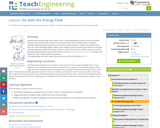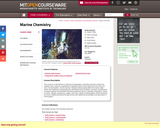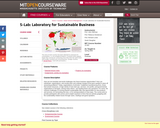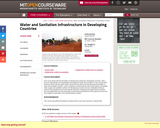
In this 8th grade science lesson, students review the six essential elements of life and discuss how they function in the garden.
- Subject:
- Life Science
- Material Type:
- Activity/Lab
- Provider:
- OER Commons
- Author:
- Kyle Cornforth
- Date Added:
- 02/21/2018

In this 8th grade science lesson, students review the six essential elements of life and discuss how they function in the garden.

Students learn about energy and nutrient flow in various biosphere climates and environments. They learn about herbivores, carnivores, omnivores, food chains and food webs, seeing the interdependence between producers, consumers and decomposers. Students are introduced to the roles of the hydrologic (water), carbon, and nitrogen cycles in sustaining the worlds' ecosystems so living organisms survive. This lesson is part of a series of six lessons in which students use their growing understanding of various environments and the engineering design process, to design and create their own model biodome ecosystems.

In this group of activities, students will investigate how nutrients and water move through ecosystems in cycles. Students will begin by investigating how carbon cycles through organisms as part of photosynthesis and cellular respiration and then through food chains. Students will discuss what happens when living things do not decompose under normal conditions and become fossilfuels. Students will then review the water cycle and discover that water connects everything inecosystems. Students will explore stories of the water cycle as told by molecules of water anddiscuss water’s importance to all living things.

" This course is an introduction to chemical oceanography. It describes reservoir models and residence time, major ion composition of seawater, inputs to and outputs from the ocean via rivers, the atmosphere, and the sea floor. Biogeochemical cycling within the oceanic water column and sediments, emphasizing the roles played by the formation, transport, and alteration of oceanic particles and the effects that these processes have on seawater composition. Cycles of carbon, nitrogen, phosphorus, oxygen, and sulfur. Uptake of anthropogenic carbon dioxide by the ocean. Material presented through lectures and student-led presentation and discussion of recent papers."

How can we translate real-world challenges into future business opportunities? How can individuals, organizations, and society learn and undergo change at the pace needed to stave off worsening problems? Today, organizations of all kinds--traditional manufacturing firms, those that extract resources, a huge variety of new start-ups, services, non-profits, and governmental organizations of all types, among many others--are tackling these very questions. For some, the massive challenges of moving towards sustainability offer real opportunities for new products and services, for reinventing old ones, or for solving problems in new ways. The course aims to provide participants with access and in-depth exposure to firms that are actively grappling with the sustainability-related issues through cases, readings and guest speakers.

An introduction to chemical oceanography. Reservoir models and residence time. Major ion composition of seawater. Inputs to and outputs from the ocean via rivers, the atmosphere, and the sea floor. Biogeochemical cycling within the oceanic water column and sediments, emphasizing the roles played by the formation, transport, and alteration of oceanic particles and the effects that these processes have on seawater composition. Cycles of carbon, nitrogen, phosphorus, oxygen, and sulfur. Uptake of anthropogenic carbon dioxide by the ocean. Material presented through lectures and student-led presentation and discussion of recent papers.